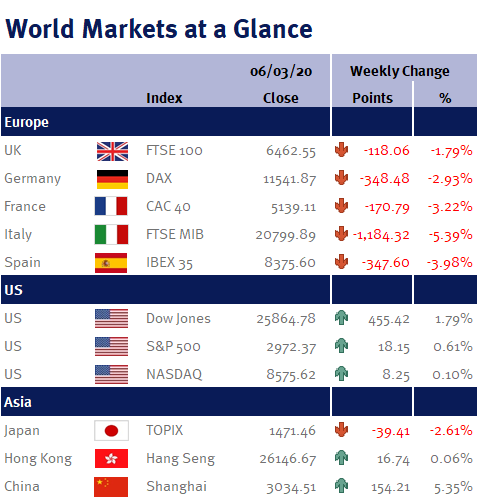Although we aren’t trying to make light of the horrible human tragedy, for global equity markets the coronavirus is likely to be a transient worry, just like SARS, swine flu, MERS, Zika virus and Ebola, as the central long-term fundamental growth drivers (technology and innovation) remain in place.
With that in mind, back in 2011 we wrote a Newsletter article titled “a crisis is a terrible thing to waste” after global equity markets were impacted by higher oil prices; the Fukushima nuclear disaster; and higher Eurozone interest rates (which exacerbated the Eurozone debt crisis) – and after this week, which has been absolutely brutal for global equity markets, this quote (credited to the economist Paul Romer in November 2004) has become very relevant today as we believe that this week’s sell-off has been emotionally-driven and as a result, indiscriminate.
Yes, the coronavirus outbreak will undoubtedly result in slower consumption and investment, which will be exacerbated by the fact that China’s economy has been in standstill for the past month. However, thanks to continued US consumer confidence (which hit a six month high this week), the outbreak is most likely to result in nothing more than a short, sharp shock and a potential mild recession, rather than a severe and protracted global downturn, which equity markets appear to be expecting and pricing – especially as we expect the Fed will act pre-emptively and cut US interest rates at their March meeting, as the best way to combat an economic downturn is to avoid one.
This does not mean that we aren’t concerned about the spread of the coronavirus. We are – and given the rapidly evolving and fluid situation it is receiving our full attention especially given the coronavirus-related company profit warnings have started to gather pace. However, activity in China is now starting to return to normal and this is positive news as this should start to alleviate the supply chain pressures that have led to these profit warnings.
While we appreciate that both the coronavirus and the resulting equity market weakness is unnerving, it is very important to maintain a long-term perspective and resist the urge for any knee-jerk reactions – and given this week’s indiscriminate emotionally-driven selling, it may not require much good news for global equity markets to rebound quickly and strongly. In fact we believe there is a reasonable chance we will see a V-shaped recovery in equity markets as soon as we get greater clarity on the spread of the coronavirus and the current fears dissipate – just as the Chinese equity market has done now coronavirus cases have peaked (while still down, Chinese equities have rebounded strongly and are now well above the bottom of their virus-induced sell-off).
There will always be periods of market uncertainty and volatility – and this is no different – but at my wealth we take a long-term approach to investing, because evidence shows that this leads to better outcomes for our clients and we believe that time in the market is more important than trying to time the market.
In fact, history is littered with periods or tragedies where equity markets have fallen sharply for a couple of days or weeks – market shocks always tend to be greater on the downside than on the upside. For example:
- during the week beginning Monday 19 October 1987 (‘Black Monday’), the FTSE-100 fell over 22%;
- during one week in October 1997, the FTSE-100 fell over 9% due to the Asian Stock Market Crisis;
- in the nine days following the atrocities of 11 September 2001, the FTSE-100 fell nearly 12%;
- in the month following the collapse of Lehman Brothers on 15 September 2008, the FTSE-100 fell 25%;
- the FTSE-100 fell nearly 15% in the first week of August 2011 following weaker than expected US economic data which suggested the global economic recovery was stalling; and
- in May 2013, after comments from the then chairman of the US Federal Reserve, Ben Bernanke, that the central bank may start winding down QE (the ‘taper tantrum’), the FTSE-100 fell nearly 12%.
However, while all of these periods were very scary at the time over the long-term they look like hiccups.
As long-term investors, we currently see plenty of opportunities to make long-term gains as equity market panics are almost always the best time to invest – and we believe that we have reached that point as the current sell-off and weak market sentiment appears to be feeding on itself.
With that in mind, we are rapidly approaching the tax year end and so we would like to remind you that if you have not already taken advantage of your ISA allowance, now is the time to act. The current limit is £20,000 and if you don’t use it by 5 April 2020, you will lose it. Contact us using the details found in your email to start the process.
While economic data doesn’t really matter in emotion-driven equity markets, looking ahead to this coming week we have Chinese PMI (which will no doubt show that their economy has been hit hard); US employment data (non-farm payrolls; unemployment rate; participation rate; and average earnings); Eurozone CPI (this is likely to slow further as the oil price has been weak due to coronavirus).
Investment Management Team


